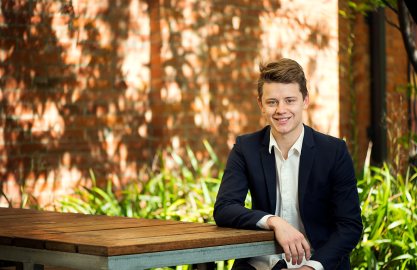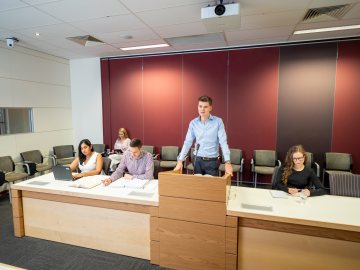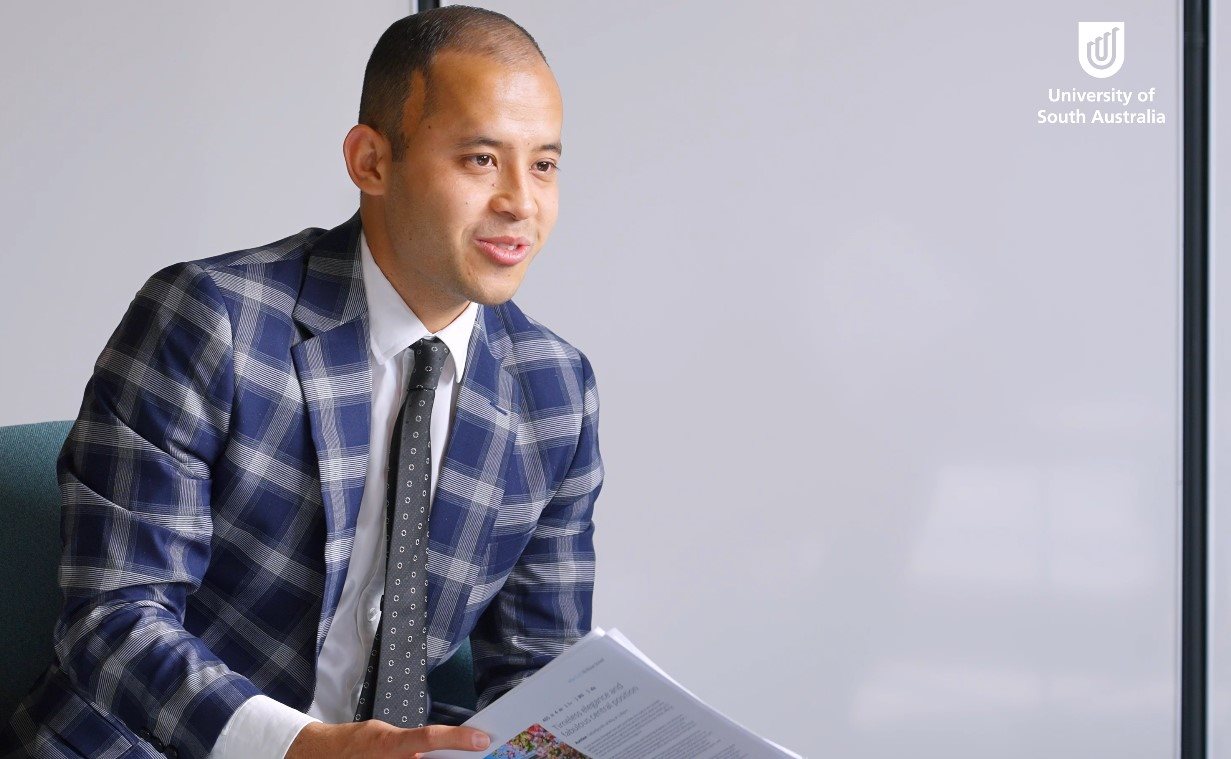Bachelor of Laws (Honours), Bachelor of Arts
Degree Level Undergraduate
Year 2024
You're considered an International student if you are:
Degree Level Undergraduate
Year 2024
Program Code
DHLD
Prerequisites
None
Assumed Knowledge
None
Fees
AUD$ 36,100 per annum (per 1.0 EFTSL) for students enrolled in 2024
Admissions
Student Profile
International Admission by Country
See full entry requirements
CRICOS Code
089093K
The admission criteria have been grouped to assist you to easily find the information most relevant to your circumstances. However, you may fit into more than one and the university will consider applicants against each of the relevant criteria.
Certain conditions apply. For more information refer to Appendix 4 of the University's Selection and Entry policy.
Applicants are required to meet one of the following criteria with a competitive result, and demonstrate that they fulfil any prerequisite requirements and essential requirements for admission:
Recent secondary education
Meet any prerequisite requirements with a minimum grade of C- or equivalent
AND
Applicants who have not achieved the Selection Rank required for automatic selection may be selected for any remaining places based on the grades of their year 12 subjects.
OR
Higher education study
OR
Vocational Education and Training (VET)
OR
Work and life experience
| Bangladesh HSC | 5 |
| Canada High School (OSSD) | 85 |
| Eynesbury FSP | 410 |
| German Abitur | 2.5 |
| Kenya KCSE (average) | A |
| Malaysia STPM (best 3) | 12 |
| Malaysia UEC | 22 |
| Norway GPA | 5 |
| Pakistan HSSC | 90 |
| Sri Lanka A Levels (best 3) | 12 |
| Sweden GPA | 17.5 |
| UK Board GCE A Levels/HK Board | 12 |
| Vietnam | 9.5 |
| Australia | 90 |
| IB (best 6) | 33 |
| USA SAT (1600) | 1420 |
| India (best 4) State Board | 90 |
| India (best 4) Central Board | 80 |
| HKDSE | 19 |
| Nepal NEB | 3.21 |
The Graduate Diploma in Legal Practice option is not available to international students studying in Australia on a student visa.
1ComparED (QILT) Graduate Outcomes Survey 2020-22, Law and Paralegal Studies – Full-time Employment Indicator (Domestic Undergraduate). SA public universities. 2ComparED (QILT) Graduate Outcomes Survey 2020-22, Humanities, Culture and Social Sciences – Full-time Employment Indicator (Domestic Undergraduate). SA public universities. 32018 Excellence in Research for Australia (ERA). 4ComparED (QILT) Student Experience Survey 2020-21, Law and Paralegal Studies (Undergraduate). Public universities. 5Ranked #4, ComparED (QILT) Student Experience Survey 2020-21, Law and Paralegal Studies – Learning Resources Indicator (Undergraduate). Public universities.
Gain a competitive edge by combining law with arts and graduate with two degrees in just 5 years. 
A double degree expands your knowledge and opens doors to a broad range of career opportunities.
You will graduate with professional honours, an advanced understanding of legal principles of Australian law and the latest legal concepts in arts. This legal expertise, combined with the knowledge and skills you’ll gain from your arts specialisation, will set you on track for a rewarding career.
In your law studies you can undertake a Community Justice Project, practice advocacy and negotiation, or gain industry experience through participation in our Legal Advice Clinic or a professional placement. You’ll also be involved in mock-trials in our moot court, learning what it’s like to act as an advocate and argue a case before a judge.
In your arts studies you can further your knowledge in an area of interest by selecting an arts major from the list of Bachelor of Arts majors. The expertise you gain in your arts-related area, in addition to your law studies, will further improve your employment prospects. Our lecturers are world-class researchers1 and under their guidance you will also develop strong skills in analysis, advanced writing, communication, and research and problem solving.
Please note: students completing this double degree cannot select Law, Policy and Politics as their arts major.
If you wish to practise law, you should also familiarise yourself with the requirements for admission as a legal practitioner in South Australia.
12018 Excellence in Research for Australia (ERA).
This degree is made up of 40 courses. You will do 24 courses in law and 12 courses in arts. 
As a UniSA Law student, you’ll gain valuable skills from day one, including in reasoning, reporting, analysis, negotiation, communication and advocacy. You will also experience what it's like to argue a case and provide legal advice.
Throughout your degree you will study core courses that teach you the fundamental legal concepts that underpin the Australian legal system. Courses such as torts, contracts, criminal law and constitutional law will give you a good understanding of basic legal principles.
Our Law program also features courses that build your leadership skills, intercultural communication, project management and capacity for community engagement.
You will have the opportunity to have practical learning experiences, including mooting, negotiation, and witness examination; ensuring you’ll be prepared for legal practice upon graduation.
In this unique arts degree, select from a range of majors to further develop your skills and knowledge in an area of interest. Combined with your Law degree, studying an arts major will increase your employment prospects. You will also graduate with writing, presentation, digital, communication, research and problem solving skills that can be transferred across a range of roles and are highly regarded by prospective employers.
You will choose one arts major from these specialisations:
Please note: students completing this double degree cannot select Law, Policy and Politics as their arts major.
Through your choice of electives you can expand your knowledge in an area of professional interest such as health law, sports law, family law and human rights law.
You can gain an extra qualification and broaden your career prospects by completing a Diploma in Languages.

With our law research recognised as world-class1, you will be taught by industry experts. Learn from those at the forefront of the legal profession with our teaching staff committed to developing not only your knowledge, but also your confidence.
You will have an advanced understanding of legal principles and methods from participating in a Community Justice Project, undertaking a professional placement, or participating in our Legal Advice Clinic, solving the legal problems of clients under the guidance of a managing solicitor.
In your arts studies you can benefit from our on-campus facilities including the industry-standard digital radio and TV studios, Hartley Playhouse and the Multimedia Languages Lab.
Our study options and extra-curricular opportunities are designed to suit your lifestyle, preferred way of learning and career interests. You can benefit from two study intakes, Summer and Winter School intensive courses, mentoring and networking opportunities, as well as accelerated learning pathways.
You can also join our active student community with the UniSA Law Students Association (USALSA) – an independent body that provides educational and vocational support, and hosts a variety of social and networking events.
12018 Excellence in Research for Australia (ERA).
At UniSA you'll learn practical, industry-ready skills to future-proof your career. Hear from our graduates Murtaza and Aria and find out where a UniSA law degree could take you.

Our quality teaching focuses on developing your practical skills and identifying opportunities for you to connect with industry beyond the classroom, which will ensure you graduate career-ready.
You will hold a desirable skillset for a diverse range of careers including:
You can also consider other legal careers such as lawyer, judge's associate, mediator and more.
This program covers in a comprehensive way the academic requirements for admission to practice as specified by the national Law Admissions Consultative Committee and applied in South Australia by the Legal Practitioners Education and Admission Council. In addition to the academic requirements of the program, students seeking admission to practice are required to complete an approved practical legal training (PLT) program. Students seeking admission to practice in other Australian jurisdictions should apply to the appropriate admitting authority.
How to apply for international students will give you helpful information about the application process at the University of South Australia. When you are ready, apply through our International Application System. If you would like to talk to someone near you about studying at the University of South Australia, we have agents all over the world who can assist you. Find an Education Agent in your country.
Australian
There are other pathways you can follow to study this degree.
International
There are other pathways you can follow to study this degree. You could consider the Bachelor of Business (Legal Studies).
Every year, over 2,500 UniSA students are supported in their studies through scholarships and grants worth millions of dollars. Check out the scholarships below. One of them may be perfect for you. Visit our scholarships page for more.
Recipients can get a 50% reduction on tuition fees for up to four years of full-time study for selected degrees.
Recipients can get a 15% reduction on tuition fees for the duration of their chosen degree.
As a UniSA student, you will have unique access to work placement opportunities, overseas study tours and exchanges, networking events, internships, guest speakers and more.
Our campuses are equipped with state-of-the-art facilities including modern lecture theatres, libraries, workshops and laboratories, as well as spaces that simulate real work environments. These are all supported by the latest technologies and a 24/7 online learning platform. We have health services on campus, gymnasiums, technology zones and great student lounges. You will also gain access to a range of community clinics, which provide professional and cost effective services in areas of health, business, law and psychology. There are campus sport activities to keep you active, and if you are keen to explore the social side of university life, there are movies, cooking demonstrations, parties and lots more.
Adelaide also has a variety of accommodation options to suit different requirements and budgets. Options include dedicated student accommodation and private rentals. See our long-term accommodation pages, or explore our student accommodation by Scape on Bank Street in Adelaide’s lively cultural precinct, an ideal location for students. It is within easy reach of UniSA’s city and metropolitan campuses, Rundle Mall shopping, the Central Market, Chinatown, and the West End’s vibrant nightlife. It is also across the road from the Adelaide train station, and on bus and tram routes.
UniSA law students can join our active UniSA Law Students Association (USALSA) and benefit from a like-minded community while participating in a variety of social and networking events.
The creation of law through judgments handed down by judges over centuries makes law one of the most significant and profound intellectual achievements of our society. Law speaks to the human condition. It cements core values – integrity, loyalty, perseverance and compassion. And it has never been needed as much it is needed today. I believe that this philosophy, which is integral to the law program at UniSA, equips you with the skills, passion and commitment to excel in your future careers – the legal profession, government, business, community enterprise and postgraduate study.
There are a number of ways to apply to study UniSA's undergraduate and postgraduate coursework degrees.
You can access our online International Application System through our How to Apply page. The International Application System is an easy and secure online application and acceptance process. You will have visibility of your application through the secure online portal with the ability to download offer documents, submit your acceptance and make a payment.
Alternatively you can submit an application through one of the University's registered Education Agents.
If you are completing an Australian year 12 qualification in Australia or overseas, or the International Baccalaureate (IB) Diploma Programme in Australia, you must apply through SATAC http://www.satac.edu.au/.
If you are applying for the UniSA Study Abroad or Study Abroad Plus program, you can submit your application online here.
Postgraduate study by research
For information on applying to do postgraduate study by research, including Masters by Research, PhDs or Doctorates, please visit http://unisa.edu.au/resdegrees.
There is no closing date for submitting your application however the admissions process takes between one and three weeks from the date that we receive your application and all required supporting documentation.
If you are completing an Australian year 12 qualification in Australia or overseas, or the International Baccalaureate (IB) Diploma Programme in Australia, you must apply through SATAC. Key dates for applications can be found here.
You may be eligible to receive credit or advanced standing for your chosen UniSA degree based on your previous studies, if they are in a related area at an equivalent or higher level. Receiving credit will reduce the number of courses you undertake within the degree, and may also reduce the overall duration of your degree.
The amount of credit you may be eligible to receive is assessed on a case-by-case basis by the Admissions team.
The best way to determine your eligibility to receive credit or advanced standing is to apply using our International Application System which can be found on our How to Apply page. You will need to supply detailed syllabus documents with your application.
UniSA welcomes the opportunity to speak with you regarding your study options. Our staff are able to talk to you about degree information, career outcomes and pathways, entry requirements, applications, and student life, so that you are able to make the best study decision for your future.
Click here to book a 1:1 appointment with one of our enquiries team.
We also have many events throughout the year in Australia and overseas where you can speak with UniSA representatives about your area of interest. View our calendar of events in your home country by selecting the 'International' filter.
